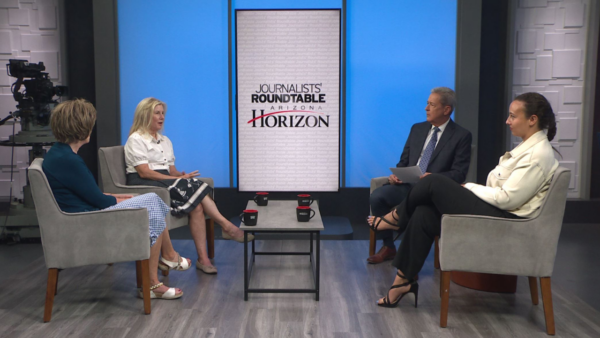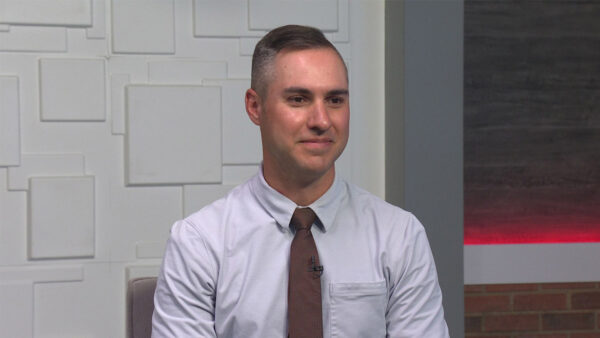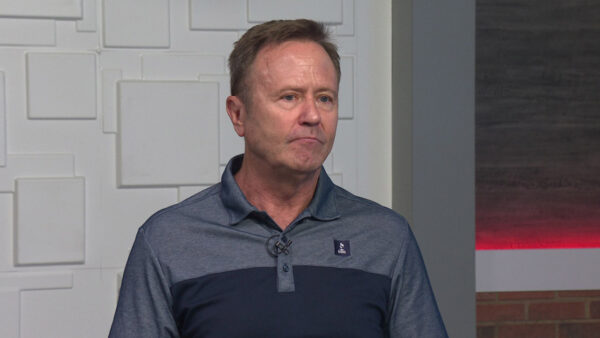Voters created the Arizona Independent Redistricting Commission to try to take politics out of the process of redrawing Arizona’s congressional and legislative district boundaries every ten years, but the latest round of redistricting is as political as ever. Hear what State Representatives Chad Campbell, leader of the House Democrats and John Kavanagh, a Republican from Fountain Hills, have to say about the redistricting process.
Ted Simons: Good evening and welcome to "Horizon." I'm Ted Simons. Every 10 years, Arizona redraws its legislative and congressional district boundaries. That used to be done by state lawmakers, but in 2000, Arizona voters transferred the task to an independent redistricting commission. The move was supposed to help take politics out of the process, but the governor has accused the commission of ignoring constitutional mapping rules, the attorney general launched an investigation of the commission, and the legislature has also entered the fray. Here to talk about all this is state representative John Kavanagh, a Republican from Fountain Hills. And representative Chad Campbell, a Phoenix democrat who serves as the house minority leader. Thanks for joining us. Why so much political interference?
John Kavanagh: There are serious concerns. Early on, the commission's behavior raised flags. They wouldn't let the Republican members choose the Republican attorney who was supposed to be assigned. And spent 37 hours in executive session. I was on a town council for six years. Over the entire six years, I never spent that long and they managed to and the chairman reading a prepared statement about the chairman of the mapping company and when the maps came out there were many, many problems with the maps. The non-partisan Rothenberg report characterized them as screwing Republicans and attorney general Horne comes out with a filing that has evidence that the open meeting law was violated by the chairperson and one or both of the members.
Chad Campbell: Let me be clear. This is a power grab by the governor and semidistraught Republicans who didn't get the districts they wanted. These maps benefit the Republicans. If anyone should be mad it should be the Democrats. On a 2-to-1 count and the legislative map overwhelmingly favors Republicans and it's apparent to me that certain incumbents that do not like the maps they got. And I just want to stress this is not a -- for the legislature to debate or the governor to debate whether or not the chair followed the law or the commission. If they have problems with that, sue them. That's what happened last time. You can sue them. But to interject politics into a process that was made independent by the voters is downright wrong.
John Kavanagh: The legislature and the governor have a responsibility to ensure that the law is enforced, particularly the governor and the attorney general. There's clear evidence, statements by witnesses, that the chairman of this committee went on the phone not in a public meeting and lined up votes and got one vote by -- votes and got one by a quid pro quo, which the democrat said on the hearing that his vote is -- that's a violation of the open meetings law and spitting in the face of the public who want an open process.
Ted Simons: If you hear of these allegations should you not investigate them?
Chad Campbell: No, it's not up to the legislature or the governor. The A.G. tried and he got removed because this was a conflict of interest. And the so-called witnesses are the same people who were exposed in the "Arizona capitol times" have been colluding with the Arizona trust, they were using taxpayer funded staff to do work on the commission. That's not the proper use of taxpayer dollars and not the proper use of taxpayer time down there and from day one it's obvious to me and everybody that the Republicans and Governor Brewer are going to bully everyone to create a map that benefited the Republicans and they're still not happy.
Ted Simons: Democrats are saying, what in the world do you want? You've got more congressional maps leaning your way and the legislative maps in Republican control. What more do you want?
John Kavanagh: It's not about who made out better. This is about having an important process that determines how people are represented being done properly and by the way, the witnesses, and I'm talking about the two Republican members who received phone calls from the chairwoman of the commission and along with the spouse of one who heard her on the speaker phone asking for a vote on the phone and in one situation, you vote for this mapping committee and I'll take care of you down the line. Quid pro quo. Criminal activity and the most critical decisions, based on blatant violation of the open meetings law, then the process is tainted and it's a poisoned tree and any maps that come from it are the fruit of the poisoned tree.
Chad Campbell: The attorney general got removed from the case and now to the county attorney, if they want to pursue investigating the commission, it's their job. It's not up to us. We're the legislative branch of government. It's not up to the governor, she's the executive branch. It's self-serving politicians trying to get maps you want. You have congressional incumbents who have to run against each other and the commission cannot consider incumbency and where certain electives live.
Ted Simons: Question. If the mapping consultant company had worked for the bush administration, if the chairman of the independent commission had a relative who had worked for Republican -- also democrat, but for the most part, Republican candidates, and you thought you were seeing monkey business going on, as far as the map redrawing, would you have raised concerns yourself, the democratic side?
Chad Campbell: It happened 10 years ago. They had a Republican leaning firm 10 years ago. They had a chairperson so biased toward the Republican party it was so transparent, it was laughable. I mean -- but we didn't use our power in an abusive way. People sued. They took them to court, that's what you're supposed to do and many of the people lost but that's how the process is supposed to work. You're supposed to sue and take litigation.
John Kavanagh: First, treasurer Horne was not removed because of a problem with his case. He was removed because he gave advice about the open meetings law and that creates a conflict of interest. His removal no way suggests that his accusations are baseless or groundless. They're firm. And the law that created this commission gives the governor and senate power to remove members if they've engaged in serious wrongdoing and not only does the evidence suggest extreme wrongdoing, and it's a prima facie case and today, the commission revealed about eight serious problems with a result that will make this die in court and certainly in Washington when it goes up for review.
Chad Campbell: The legislative committee that Mr. Kavanagh refers to was a committee that came out with a false and erroneous set of principles and guidelines. Nothing in the report they have is factual. Nothing they have pertains to the legal power of the commission. It's -- to be honest, that paper is junk. It's scrap that should be shredded and means nothing and if were to go to court, the department of justice, the commissions' work would stand. The concern would be that the Democrats got the short end of the stick, not the Republicans.
Ted Simons: Quickly, if this gets bottled up and justice didn't get this in time and the districts wind up being drawn by a court, or someone else other than the commission, will you be satisfied?
Chad Campbell: I don't know. I can't tell you. I can't see the map. I don't know how the process would work. But I know right now, you have a governor abusing her power and we saw in the "Arizona Republic," you have a legislature enabling her and undermining a voter-approved process.
John Kavanagh: The governor hasn't abused any power. She's within her rights to question --
Chad Campbell: She has no right.
John Kavanagh: The commission has lawyered up. They've run to get lawyers.
Ted Simons: The question would be, would you not lawyer up when the governor tells you have a deadline to answer these questions or else.
John Kavanagh: She lawyered up when the -- when they were asked questions about the irregularities.
Chad Campbell: They sent letters back to the governor today, and if I'm the target of a witch hunt, I'll get an attorney. The governor has no authority to question the commission.
Ted Simons: We've got to stop it there. I think we've managed to take politics completely out of the process. [Laughter] Good to have you here. Thank you.
Chad Campbell: Leader of the House Democrats,John Kavanagh: a Republican from Fountain Hills























